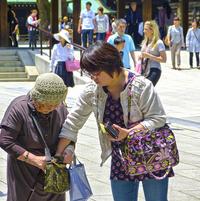Caregiving has always been a cornerstone of family life as an act of love, responsibility, and, often, sheer necessity. But for immigrant families, caregiving often comes with a unique set of challenges beyond what is typically considered in care for older adults.
Availability of Family Networks in Immigrant Households
Families traditionally provide emotional, financial, and practical support to one another throughout life. But we should not forget that this support is conditional to the physical presence and availability of family members. The situation of family solidarities being conditioned by the availability of the family network has important implications for immigrant populations.
Imagine moving to a new country where extended family members – parents, siblings, or cousins – are no longer nearby. In this new reality, immigrants who become ill at an older age often face limited family support and informal care – simply because most of their family members are not physically present. The situation is further complicated by the fact that older immigrants not only lack robust family support networks, but are also less likely to access formal caregiving services due to language difficulties, cultural unfamiliarity, and financial constraints.
Caregiving Burdens and Their Impacts
The caregiving burden in immigrant families is often magnified as the caregivers, too, are often migrants who relocated with the care receiver and, hence, encounter several immigrant-specific difficulties in the host country. Immigrants who take on the caregiving role for their family members frequently face the challenge of balancing employment, household responsibilities, and caregiving tasks, often without the safety net of external support. This intensifies the physical and emotional toll of caregiving, leaving many immigrant caregivers vulnerable to burnout.
The impact of this burden extends beyond the caregivers themselves. Overstretched caregiving arrangements can compromise the quality of care for older adults, particularly those with complex health needs. Additionally, caregivers often experience financial strain, as they may reduce work hours or leave employment altogether to accommodate caregiving demands. These economic pressures, coupled with the emotional stress of caregiving, create a cycle of challenges that can be difficult to break without adequate support.
Cultural Expectations and Caregiving Norms
While immigrant families often share similar challenges for caregiving – limited support networks and heightened burdens – how they approach and what they expect in care for older family members can vary considerably depending on their cultural background. In wealthier countries, older adults typically live in one-generation households, while in many developing countries, multigenerational households and close-knit family living arrangements are more common. These differences mean that immigrants bring diverse preferences and values about family care to their host countries, shaped by the traditions of their country of origin. For instance, some immigrant groups hold strong cultural expectations about living with and caring for older parents, while others may be more accustomed to independent living arrangements. This diversity in cultural expectations means there's no one-size-fits-all approach to supporting immigrant families – what works well for one immigrant community might be ineffective or culturally inappropriate for another.
Conclusion
As immigrants age in their host countries, they often struggle to access formal health and social care services due to language barriers and unfamiliarity with available resources. Yet how they want to receive care varies significantly based on their cultural background - some communities strongly prefer family-based care, while others are more open to formal support. This cultural diversity calls for thoughtfully designed support systems. For immigrant groups with strong traditions of filial care, this might mean providing resources that enable and support family caregiving, such as housing assistance for multigenerational households, training programs for family caregivers, and respite care services that involve community members from similar cultural backgrounds. For those more comfortable with formal care arrangements, support might focus on making existing services more accessible through translation services and cultural mediation. Through these culturally tailored approaches, support systems can effectively address the diverse caregiving needs of immigrant communities.
About the Author
Su Yoen Jang is a Research Fellow at the Oxford Institute of Population Ageing.
Opinions of the blogger is their own and not endorsed by the Institute
Comments Welcome: We welcome your comments on this or any of the Institute's blog posts. Please feel free to email comments to be posted on your behalf to administrator@ageing.ox.ac.uk or use the Disqus facility linked below.













